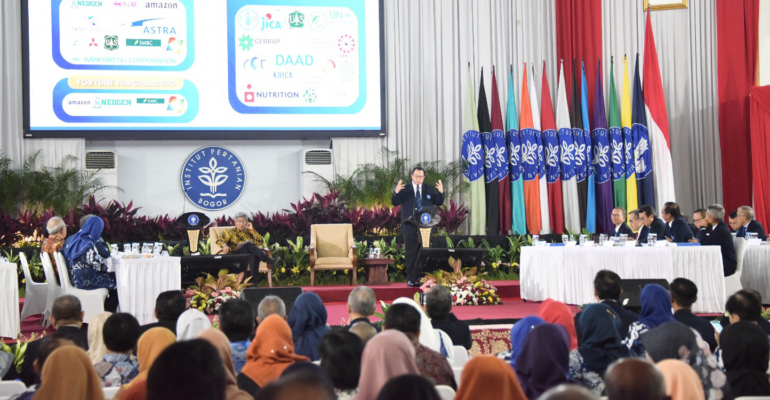Open Plenary Session of the Board of Trustees and Joint Meeting of IPB University 2024: Rector Mentioned the Achievement of IKU 96 Percent

The achievement of IPB University’s Main Performance Indicators (IKU) in 2023 reached 96 per cent. This figure is an average of all IPB University’s KPI achievements. Of the 10 indicators, as many as 8 indicators have even exceeded the targeted number.
This was conveyed by the Rector of IPB University, Prof Arif Satria in the Open Plenary Session of the Board of Trustees (MWA) and the Joint Meeting of IPB University 2024 (28/2). In front of the Chairman of MWA and all IPB University residents, Prof Arif presented the 2023 Performance Report as well as the 2024 Work Programme.
Prof Tridoyo Kusumastanto, Chairman of MWA IPB University in the opening of the Open Session said that the rector’s work programme will always be evaluated every year. This provision has been regulated in the Statute of IPB University.
“The evaluation of the rector’s work programme is a process of interaction and establishing communication and aspirations. It is hoped that through the implementation of this plenary session, a culture of continuous improvement can be built,” said Prof Tridoyo.
With this culture, he expects synergistic cooperation to be built within IPB University, from the highest leadership to the level of work units. “Thus, good university governance will be built and IPB University’s contribution to society and the Indonesian nation can be understood and observed,” he added.
Prof Arif Satria, at the beginning of his presentation mentioned two keywords in building IPB University as a ‘techno-socio preneurial university’. The two keywords are superior human resources (HR) and superior innovation.
“Producing technopreneur and sociopreneur figures requires superior human resources, with character qualifications, mindset, skill set and new literacy,” he said.
Meanwhile, the Rector continued, superior innovation boils down to two things: sustainability development goals (SDGs) and technological innovation 4.0.
According to Prof Arif, to be able to produce superior human resources and innovation, it is necessary to build the main ecosystem (education and student affairs, research and innovation, and community service).
In addition, supporting ecosystems include adaptive human resources, accountable finance, green and smart infrastructure, agile organisations and sustainable cooperation. Equally important is solid and adequate information technology.
“In IPB’s vision 2024, namely Resilient Ecosystem for Advanced Science and Technology, we focus on a transformative organisation that is resilient to rapid and unexpected shocks,” he explained.
Rector also mentioned a number of infrastructure facilities that will be built in 2024, including the development of Advance Laboratory (ARLab) with a budget of 250 billion rupiah. The budget comes from the Inter-University Centre of Excellence Programme (PUAPT) and community funds (DM).
In the event of the Open Plenary Session of the Board of Trustees and Rabuan Bersama IPB University, three new applications were also launched, namely IPB Virtual Museum, IPB e-Perjadin and IPB Seamless Presence. (dh/Rz) (IAAS/RUM)


